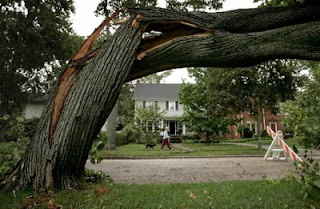Me
Last Monday a woman in my office wasn't at her desk when I arrived in the morning. The day progressed and periodically I checked for her, yet was never able to find her. Finally I asked a secretary if she knew if Beth would be in at all. I was told she was out because on Sunday, Beth lost her house. Over the weekend a bad storm had passed through the area and along with creating a tornado, knocked down some trees. Especially hard hit was Lake Murray, an area near Columbia where Beth had a summer vacation home. When I heard the news and verified that Beth and family were okay my mind immediately clicked. It was as if some kind of primal fight or flight instinct kicked in and I opined, "I wonder if the storm was made worse by the lake?"
At first the seemingly innocuous nature of the question didn't bother me until I sat down and thought about it with more contemplation and depth. What I had done was a process that the vast majority of us are guilty of on a daily bases. In fact, we do it so much we exist almost completely blind of our own thought process. Let's look again at the sequence. First I was told of a disaster that beset the life of a woman in my office. I was properly concerned for her health however the responding question was not about her in truth, it was about me. I was immediately taking her circumstance and applying it to myself. I was placing it against my own life in an effort to evaluate my risk and diminish the possibility of such a tragedy happening to me. While it is natural to do this, was it really the appropriate time?
In reality we do this constantly with every piece of information that comes into our brains throughout the day. Every story told by a coworker or friend. Every piece of news is placed against the context of our own life. Every tragic reference to the sickness of another is immediately evaluated against our own personal habits and lifestyle.
Perhaps there is a deeply psychological component. One that uses our own position in life to evaluate risk and manage that risk. Or, at the very least, mentally diminish it. The more I contemplate the action, it seems somewhat selfish to allow that type of thought to dominant the relevance of the life of another.
Human beings are inherently selfish. Often times all of our needs and actions are governed by our own desires. Only the truly unique can look beyond this without the thought entering their mind. I am going to try to do this. I doubt I will succeed entirely or even most of the time, but I will try. It goes back to the very foundation of a society vs the desires of the individual. Of course there must be a balance, yet it is intriguing to look and find how a long term perspective can not only regulate our own desires but re-invent them. It is like paying property tax to fund a school. Some say why should they do it? The do not have a child. Yet the way a child is educated in that school may determine the remainder of their life. Will they some day be a doctor or cure a disease? What will their contribution be? How will it impact the life of the person not wanting to pay the tax. How will this change if the child's life was sacrificed to poverty, crime and drugs?
While two giant trees toppled Beth's house she will be okay. She lost a summer home and a place filled with memories. Memories of her husbands proposal and of her children growing up. Memories etched into her brain that now no longer have a physical reality. That said, she is lucky to have another place to live that sheltered the majority her heirlooms, not to mention the lives of her family. While she thankfully is okay the tree hit something else. It hit my conscious and perhaps from the rubble of my mind I can construct less selfish thoughts.
At first the seemingly innocuous nature of the question didn't bother me until I sat down and thought about it with more contemplation and depth. What I had done was a process that the vast majority of us are guilty of on a daily bases. In fact, we do it so much we exist almost completely blind of our own thought process. Let's look again at the sequence. First I was told of a disaster that beset the life of a woman in my office. I was properly concerned for her health however the responding question was not about her in truth, it was about me. I was immediately taking her circumstance and applying it to myself. I was placing it against my own life in an effort to evaluate my risk and diminish the possibility of such a tragedy happening to me. While it is natural to do this, was it really the appropriate time?
In reality we do this constantly with every piece of information that comes into our brains throughout the day. Every story told by a coworker or friend. Every piece of news is placed against the context of our own life. Every tragic reference to the sickness of another is immediately evaluated against our own personal habits and lifestyle.
Perhaps there is a deeply psychological component. One that uses our own position in life to evaluate risk and manage that risk. Or, at the very least, mentally diminish it. The more I contemplate the action, it seems somewhat selfish to allow that type of thought to dominant the relevance of the life of another.
Human beings are inherently selfish. Often times all of our needs and actions are governed by our own desires. Only the truly unique can look beyond this without the thought entering their mind. I am going to try to do this. I doubt I will succeed entirely or even most of the time, but I will try. It goes back to the very foundation of a society vs the desires of the individual. Of course there must be a balance, yet it is intriguing to look and find how a long term perspective can not only regulate our own desires but re-invent them. It is like paying property tax to fund a school. Some say why should they do it? The do not have a child. Yet the way a child is educated in that school may determine the remainder of their life. Will they some day be a doctor or cure a disease? What will their contribution be? How will it impact the life of the person not wanting to pay the tax. How will this change if the child's life was sacrificed to poverty, crime and drugs?
While two giant trees toppled Beth's house she will be okay. She lost a summer home and a place filled with memories. Memories of her husbands proposal and of her children growing up. Memories etched into her brain that now no longer have a physical reality. That said, she is lucky to have another place to live that sheltered the majority her heirlooms, not to mention the lives of her family. While she thankfully is okay the tree hit something else. It hit my conscious and perhaps from the rubble of my mind I can construct less selfish thoughts.




Comments
Post a Comment
Thank you for your comment. I love to hear from anyone that reads what I write.